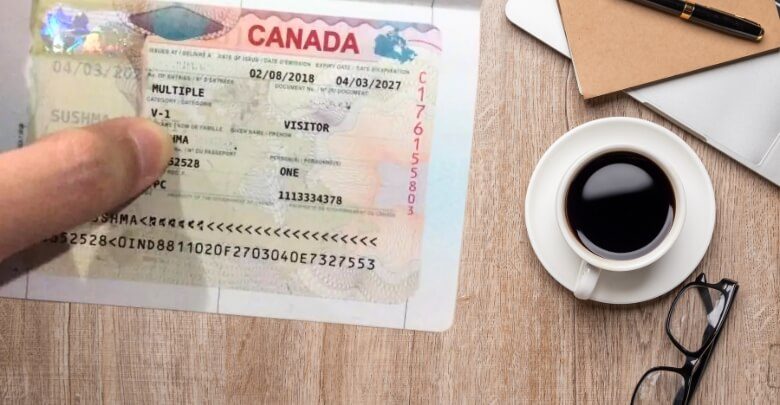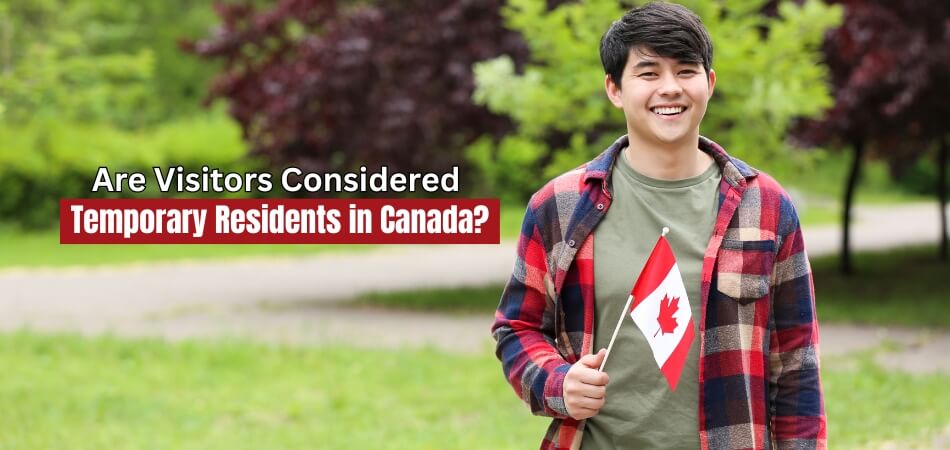Any visitor planning to travel to Canada temporarily, whether for tourism, business, or family reasons, will need a visitor visa. This visa allows individuals to enter the country for specific purposes and stay for a limited duration. This is where a question arises, “Are visitors considered temporary residents in Canada?”
Yes, visitors to Canada are classified as temporary residents upon receiving their visitor visa. This status allows them to stay in the country for a specified period, typically up to six months. However, the duration can vary based on visa conditions and the purpose of the visit. Visitors must follow these conditions to maintain their legal status.
Are you curious about the requirements and processes related to visitor visas? This article covers everything you need to know about obtaining a visitor visa and the implications of being a temporary resident in Canada.
Getting a Visitor Visa for Canada: Why is it Important?
A visitor visa for Canada is essential because it allows you to enter the country legally for specific purposes, such as tourism, business, or family visits. Without this visa, you cannot legally stay in Canada, even if your visit is temporary.

For many, a visa is the first step toward attending important events like business meetings or trade shows. It’s necessary to understand the requirements and ensure that all documentation is prepared properly to avoid delays in the process.
In cases where individuals are invited to attend a specific event, like a canada conference with invitation letter, it becomes even more important to have a valid visitor visa. This ensures that your entry into the country is smooth, and you are able to fulfill your plans accordingly.
Are Visitors Considered Temporary Residents in Canada?
A temporary resident permit allows visitors to stay in Canada for a specific period of time under certain conditions. This applies to tourists, business travelers, and others visiting for short-term purposes. Several factors explain why visitors are considered temporary residents. Let’s dive into these key factors:
Legal Status of Visitors in Canada
After receiving a visitor visa, visitors to Canada become temporary residents. This status ensures that they are recognized by the Canadian immigration system as individuals staying for a limited duration. This classification plays a key role in maintaining legal oversight of visitors, distinguishing them from permanent residents or citizens.
Duration of Stay
The period for which visitors can remain in Canada is clearly defined by the visa issued. Typically, temporary residents are allowed to stay for up to six months. However, shorter stays may be required depending on the nature of the visit. Extensions must be applied for before the expiration of their current visa.
Rights and Restrictions of Temporary Residents
While visiting Canada, temporary residents enjoy various rights, such as the right to travel freely. However, there are restrictions in place, such as the inability to work or study unless granted specific permits. These conditions help to differentiate short-term visitors from residents who have a longer-term commitment.
Purpose of the Visit
The reason for visiting Canada plays a significant role in granting temporary resident status. Tourists, business visitors, or those attending conferences are considered temporary residents due to the short-term nature of their visits. This classification ensures that each visitor abides by the visa conditions tied to their specific purpose.
Monitoring of Entry and Exit
Canada closely monitors the entry and exit of temporary residents to ensure that visitors comply with the visa conditions. This system helps prevent overstays, which would otherwise violate immigration laws. Monitoring ensures that temporary residents adhere to their allotted time in the country, maintaining lawful conduct throughout their stay.
Changes to Temporary Resident Status
Visitors can request to change or extend their temporary resident status if their circumstances change. For instance, if a visitor needs to stay longer, they can apply for an extension. These requests must be made following the proper procedures and within the legal timeframe to ensure that the status remains valid.
By understanding these factors, visitors can better appreciate their classification as temporary residents. Remaining aware of the conditions attached to this status ensures a smooth stay and helps travelers navigate the immigration requirements effectively.
Who Can Apply for a Visitor Visa?
Those planning to visit Canada for a temporary stay need a visitor visa. Whether it’s for tourism, business, or other purposes, individuals from different countries must meet certain criteria. Let’s look at who can apply for a visitor visa.
- Tourists: Individuals who wish to explore Canada’s beautiful landscapes and cultural attractions can apply for a visitor visa, allowing them to experience the country’s tourist spots for a limited time.
- Business Visitors: People attending meetings, conferences, or trade shows in Canada need a visitor visa for their short-term stay. This allows them to conduct business without seeking long-term residency.
- Family Members: Visiting relatives in Canada can be permitted with a visitor visa, allowing them to spend time with them during holidays, family gatherings, or special occasions.
- Students on Short Courses: Visitors who attend courses lasting less than six months can apply for a visitor visa. This ensures they can legally stay in Canada while completing their studies.
- Event Participants: Sports competitions, cultural festivals, or exhibitions require a visitor visa. This allows them to participate without needing a work or study permit.
- People on Transit: Travelers who are passing through Canada to reach another destination may require a visitor visa. This permits them to stay in Canada temporarily during their transit.
Understanding who can apply for a visitor visa is crucial for anyone planning to visit Canada. By following the guidelines and fulfilling the necessary requirements, visitors can enjoy their stay without any complications.
What Should You Consider Before Applying for a Canadian Visitor Visa?
Taking the necessary steps to apply for a Canadian visitor visa is important before you begin. Ensuring that all the necessary documentation and details are in order will help make the process smoother. Here are some things to consider:
Qualification Requirements
The first thing individuals need to do before they apply for a visa is check if they meet the basic requirements. These requirements include having a valid passport, proof of financial support, and being in good health. Meeting these prerequisites is crucial to obtaining a visa.
Purpose of Visit
It is essential that applicants clearly understand the reason for their visit, whether it is for tourism, business, or to visit family. Having a clearly defined reason for the visit strengthens the application and helps immigration officers understand what the visitor is hoping to accomplish.
Proof of Funds
A successful applicant must demonstrate that they have sufficient funds to cover their stay in Canada for the duration of their application. As proof of their ability to support themselves without the need for financial assistance, they may be required to submit bank statements or other financial documents.
Supporting Documents
It’s important to gather all the required supporting documents, such as a letter of invitation, travel itinerary, and accommodation details. Submitting complete and accurate documentation ensures that the application is processed without unnecessary delays.
Understanding Visa Differences
When preparing for the application, it’s also important to consider the difference between visitor and tourist visa, as these terms are sometimes used differently based on the intended activities. Knowing which visa suits your purpose can help simplify the process and avoid confusion.
Considering all these factors will help applicants prepare better for the Canadian visitor visa process. Staying organized and ensuring that everything is in place increases the chances of a successful visa application and a smooth trip to Canada.
How Long Can Visitors Stay as Temporary Residents in Canada?
For a limited time, visitors to Canada are granted temporary resident status. The length of stay depends on several factors outlined in the visa or entry stamp. Understanding these factors helps ensure compliance with immigration rules.
- Visitors are typically allowed to stay for up to six months, although immigration officers may specify a shorter duration depending on the purpose of the visit and other conditions.
- If the visa holder wishes to extend their stay beyond the authorized period, they must apply for an extension before their visa expires, providing valid reasons and supporting documentation.
- The return date must be clearly stated on the visitor’s documentation. Authorities may ask for proof of return travel to confirm that the visitor intends to leave at the end of the allowed period.
- Individuals entering into a specific program or agreement may be granted a different length of stay, depending on the terms. This may include students attending short courses or participants in special events.
- In some cases, visitors arriving from visa-free countries may still be restricted by entry stamps, which define their length of stay even without a visa.
- Exceeding the authorized stay could lead to future visa denials, so it’s important to follow the guidelines and request an extension if needed to avoid any legal issues.
Keeping track of the permitted stay is essential for any visitor in Canada. Staying informed of your status and complying with the immigration rules ensures a hassle-free visit and a smooth departure
How to Apply for a Visitor Visa in Canada?
The process of applying for a visitor visa in Canada requires careful preparation and attention to detail. Understanding the steps involved can streamline the process and help ensure that all necessary documentation is submitted correctly. Here’s a guide to managing the application process effectively.
Step 1. Determine the Visa Type
First, it’s essential to identify the correct visa type based on your purpose of visit. Whether you are traveling for tourism, business, or visiting family, knowing the right category helps in preparing the right documents. Each type may have different requirements, so being clear on your intentions is crucial.
Step 2. Gather Required Documents
Next, applicants must gather all the necessary documentation to support their application. This typically includes a valid passport, proof of financial support, and any relevant letters of invitation. Collecting these documents ahead of time reduces delays and helps ensure a smooth submission.
Step 3. Complete the Application Form
Filling out the application form accurately is a critical step. Applicants can find the necessary forms online, and they must ensure that all sections are completed thoroughly. Any discrepancies or missing information can lead to processing delays, impacting your plans.
Step 4. Pay the Application Fee
After completing the application, the next step is to pay the required fee. This fee varies depending on the visa type and can typically be paid online. Keeping the payment receipt is essential, as it serves as proof of your transaction when submitting the application.
Step 5. Submit Your Application
Finally, once all documents are ready and the fee is paid, applicants must submit their application either online or in person at the designated visa application center. Following submission, tracking the application can provide insights into the progress and expected processing times. For those seeking a quicker outcome, understanding the factors that contribute to a fast visa processing time for Canada can be beneficial.
Anyone planning to apply for a visitor visa should understand these steps. Careful preparation and attention to detail can significantly enhance the chances of a successful application and a positive experience in Canada.
Frequently Asked Questions
Here we address common questions regarding visitors’ classification as temporary residents. Understanding these aspects can help clarify any uncertainties and provide valuable insights into the visitor experience in Canada.
What Rights Do Temporary Residents Have in Canada?
There are a number of rights that temporary residents enjoy in Canada, such as the right to travel freely within the country and the right to access certain services. However, they cannot work or study without specific permits. These rights are designed to allow visitors to enjoy their stay while adhering to immigration laws.
Can Temporary Residents Apply for Permanent Residency in Canada?
Yes, temporary residents may apply for permanent residency in Canada under certain conditions. They must meet specific criteria, such as work experience or family connections. Temporary residency can sometimes be a pathway to permanent residency if visitors fulfill the necessary requirements during their stay.
Are There Any Restrictions on the Activities of Temporary Residents?
Temporary residents must adhere to specific restrictions during their stay. While they can engage in tourism and short visits, they are not allowed to work or attend school without obtaining the appropriate permits. These limitations ensure alignment with Canada’s immigration regulations.
How Can Temporary Residents Maintain Their Legal Status in Canada?
To maintain their legal status, temporary residents must abide by the conditions of their visitor visa. This includes not overstaying their authorized period and adhering to any other requirements. If they wish to extend their stay, they must apply for an extension before their visa expires.
What Happens if a Visitor Overstays Their Temporary Resident Status?
It is possible to face serious issues if you overstay your temporary resident status, including being barred from entering Canada again in the future. Visitors who overstay may face difficulties obtaining visas or permits later on. It is essential to comply with visa conditions to avoid such issues.
Bottom Line
Anyone planning a trip to Canada should understand how visitors are classified. This knowledge helps you get through the complexities of immigration rules and ensures that you adhere to the necessary regulations during your stay. A clear grasp of your status can make your visit more enjoyable and stress-free.
So, are visitors considered temporary residents in Canada? Yes, they are. Visitors who obtain a visitor visa are legally recognized as temporary residents, allowing them to stay for a specified period. This status comes with certain rights and restrictions, making it vital to be aware of what is permitted during your visit.
Remember to gather all necessary documentation, understand the conditions tied to your visitor status, and stay informed about how long you will be staying. Make the most of your adventure in Canada! Your adventure awaits you!







